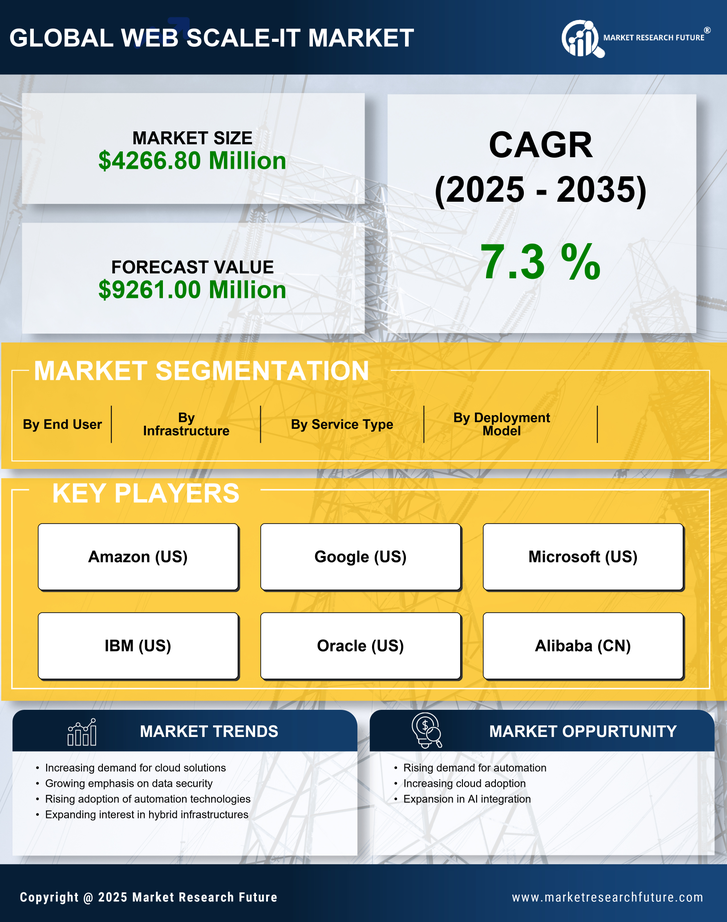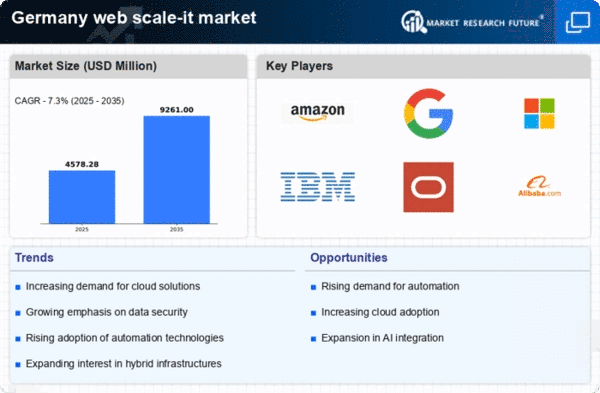Emphasis on Cost Efficiency
Cost efficiency remains a critical driver in the web scale-it market in Germany. Organizations are increasingly seeking solutions that not only enhance performance but also reduce overall IT expenditures. The rising costs associated with traditional IT infrastructure compel businesses to explore more economical alternatives. Reports indicate that companies can achieve up to 30% savings by transitioning to web scale-it solutions, which streamline operations and minimize resource wastage. This focus on cost efficiency is particularly relevant in a competitive landscape where profit margins are under pressure. Consequently, the web scale-it market is likely to see sustained growth as businesses prioritize budget-friendly solutions that do not compromise on quality or performance.
Growing Importance of Data Analytics
In the context of the web scale-it market in Germany, the growing importance of data analytics cannot be overlooked. Organizations are increasingly recognizing the value of data-driven decision-making, which necessitates robust IT frameworks capable of processing large volumes of data efficiently. The demand for advanced analytics tools is projected to grow by 25% annually, as companies strive to harness insights for strategic advantage. This trend underscores the need for scalable IT solutions that can support complex data operations. The web scale-it market is thus likely to expand as businesses invest in technologies that facilitate real-time analytics and enhance their competitive positioning.
Shift Towards Hybrid IT Environments
The transition towards hybrid IT environments is a significant driver in the web scale-it market in Germany. Organizations are increasingly adopting a combination of on-premises and cloud-based solutions to optimize their IT strategies. This hybrid approach allows for greater flexibility, enabling businesses to tailor their IT infrastructure to meet specific operational needs. Recent surveys indicate that over 60% of German companies are implementing hybrid models to balance performance and cost. This trend is indicative of a broader shift in the web scale-it market, as organizations seek to leverage the benefits of both traditional and cloud-based systems to enhance their agility and responsiveness.
Rising Demand for Scalable Infrastructure
The web scale-it market in Germany experiences a notable surge in demand for scalable infrastructure solutions. As businesses increasingly migrate to digital platforms, the need for flexible and efficient systems becomes paramount. This trend is driven by the necessity to accommodate fluctuating workloads and enhance operational efficiency. According to recent data, approximately 70% of German enterprises are prioritizing investments in scalable IT solutions to support their growth strategies. This shift not only optimizes resource allocation but also reduces operational costs, thereby fostering a competitive edge in the market. The web scale-it market is thus positioned to benefit from this growing inclination towards scalable infrastructure, as organizations seek to leverage technology for improved performance and agility.
Regulatory Compliance and Data Sovereignty
Regulatory compliance and data sovereignty are pivotal considerations in the web scale-it market in Germany. With stringent data protection laws, such as the General Data Protection Regulation (GDPR), organizations must ensure that their IT solutions adhere to legal requirements. This necessity drives demand for web scale-it solutions that offer robust compliance features. Companies are increasingly investing in technologies that facilitate data governance and security, as non-compliance can result in substantial penalties. The web scale-it market is thus likely to see growth as businesses prioritize solutions that not only meet regulatory standards but also enhance their overall data management capabilities.

















